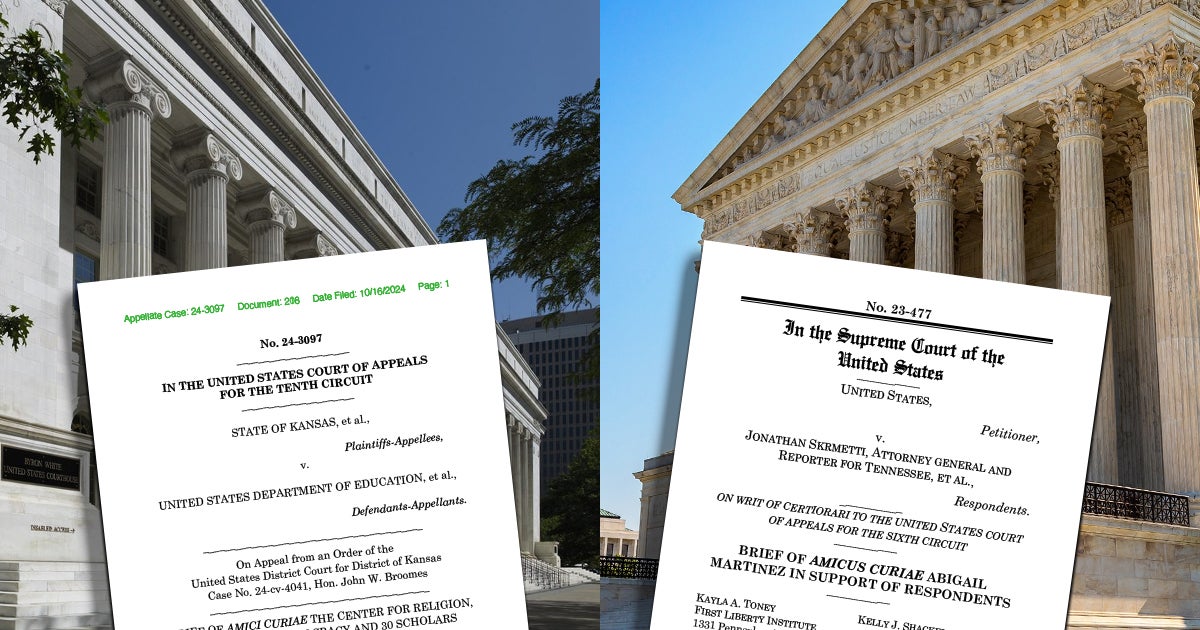
by Jorge Gomez • 4 minutes
This week, First Liberty filed friend-of-the-court briefs in two important cases pending at the U.S. Supreme Court and the 10th U.S. Circuit Court of Appeals.
Parental Rights: Choosing Their Children’s Religious Upbringing
The Supreme Court agreed to hear United States v. Skrmetti, a case that deals with a Tennessee law that bans healthcare providers from performing surgeries or administering hormones or puberty blockers to minors for the purpose of gender transitions. The key question is whether that law violates the U.S. Constitution, specifically the Equal Protection Clause of the 14th Amendment.
The teens who challenged Tennessee’s law partially won at the district court level. The judge put the state’s ban on hormone therapy and puberty blockers on hold, but not the ban on gender-transition surgeries, since the teens hadn’t been candidates for such surgeries. But then the 6th U.S. Circuit Court of Appeals overturned that decision and upheld the law as constitutional. The 6th Circuit ruling declined to recognize a new constitutional right in the area of gender-transition procedures.
Though the case is not specifically about religious freedom or the First Amendment, the outcome could impact Americans with deeply held religious convictions about sex and gender.
We filed the brief on behalf of Abigail Martinez, a Christian mom in California, whose young daughter, Yaeli, began to question her sexuality. The teen struggled with intense depression for years, and an older transgender friend told her the only way to be happy was to change genders. School staff encouraged her to covertly join the LGBTQ club and hide it from her mom. The school psychologist recommended a gender transition, rather than treatment for her depression.
Abigail tried to advocate for Yaeli to receive mental health treatment from the school, but the school staff rebuffed her. In 2016, the state took Yaeli away from her home. By age 19, Yaeli’s depression had not been solved by the attempt at transition. Her pain was too deep, and hormone treatments made it worse. Yaeli eventually committed suicide.
The government’s imposition into Yaeli’s life against the wishes of her mother denied Abigail the opportunity to treat her daughter’s mental health and likely save her life.
The families who challenged Tennessee’s law say it violates their parental rights. But as the appellate court noted, there is no deeply rooted tradition that supports a parent’s right to obtain reasonably banned medical treatments for children.
Our brief argues that Tennessee’s law does not violate parental rights but strengthens the existing protections that the Constitution upholds, such as the right of parents to raise their children in accordance with their religious beliefs.
As we point out in our brief, “There is perhaps no right more deeply rooted in our Nation’s history and tradition than the right of parents to direct their children’s religious upbringing,”
“This is especially true for religious parents like Abigail Martinez,” the brief concludes. “If her state had passed SB1, she would likely have never lost custody of Yaeli, government officials could not have mandated gender-transition treatments over her objections, and her beloved daughter would likely be alive today.”
Government Can’t Force Americans to Speak Messages That Violate Their Convictions
First Liberty also filed an amicus brief in State of Kansas v. U.S. Department of Education, a case pending at the 10th U.S. Circuit Court of Appeals.
The state of Kansas, along with three other states, and private groups of parents, students, and female athletes, are challenging a Biden-Harris administration rule that attempts to rewrite Title IX to include “gender identity” in the federal definition of “sex.”
Title IX of the Education Amendments of 1972 is a civil rights law that protects students from discrimination based on sex in education programs or activities that receive federal financial assistance. It was signed into law to give female athletes equal opportunity and treatment in sports, from elementary schools to colleges.
We filed the amicus brief on behalf of 30 scholars, who raise concern that the Biden-Harris administration’s rule forces school children to use other students’ preferred pronouns or else risk investigation or discipline. Under the new rule, school children cannot simply stay silent. This administration wants to force them to affirm preferred pronouns, even when doing so violates their faith and forces them to lie.
“They may either betray themselves as heretical dissenters from gender ideology, betray their religious convictions by agreeing to use the preferred pronouns, or face punishment for remaining silent,” the brief states.
We explain that the outcome of this case impacts religious freedom, the freedom of expression and the liberty of silence—which includes a right not to speak messages that go against one’s religious beliefs or convictions.
“It would be surprising and out of character with America’s tradition of civil liberty under law,” the brief concludes, “were this court to empower a government agency to compel school children to use particular pronouns in reference to a particular person rather than leave them at liberty to remain silent on the matter.”